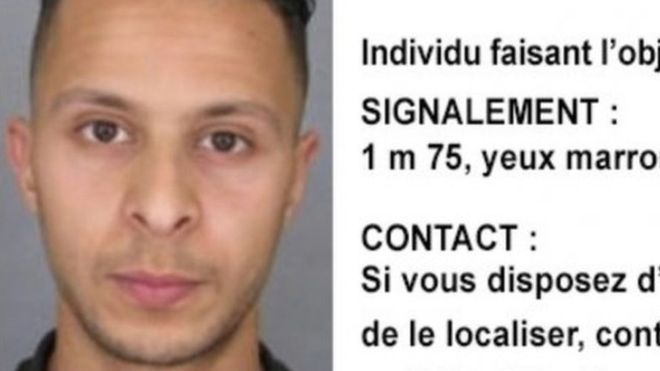Brussels attacks: Paris attack suspect Abdeslam goes silent

Paris attack suspect Salah Abdeslam refused to speak when asked about Tuesday's attacks in Brussels, Belgian prosecutors say.
They said that Abdeslam, arrested last week in Brussels and initially cooperative, had "exercised his right to silence" and said nothing when interviewed after Tuesday's bombings.
He was seized days before the Brussels attacks, in which 31 people died.
Twelve people were arrested on Thursday and Friday in three countries.
Six were detained in Belgium on Thursday and three on Friday, though several were later released.
Two were held in Germany and one in France, as a plot said to be in its advanced stages was foiled.
Meanwhile Belgian officials named the second suicide bomber in Tuesday's attack at Brussels airport as Najim Laachraoui, and said that his DNA was also found at sites of the November Paris attacks.
Najim Laachraoui (C) and (R) and reportedly (L) too from airport CCTV

So-called Islamic State (IS) has said it carried out both the Brussels attacks, and the ones in Paris in November.
On Friday it released a video about the Brussels attacks, presenting them as retribution for coalition attacks against IS territory in Iraq and Syria.
Abdeslam was arrested on 18 March in a dramatic operation in central Brussels after apparently hiding in the city for more than four months.
Describing Abdeslam's interrogation since his arrest, the prosecutor's office said he was not interviewed that day as he was receiving hospital treatment — he was wounded in the leg during his arrest.
His first interview was at 08:00 (07:00 GMT) the following day, when investigators went through the main points of the Paris inquiry.
Two interviews with the investigating judge followed, the second of which related to a European arrest warrant issued against him.
On this occasion Abdeslam exercised his right to silence.
He was interviewed again on 22 March immediately after the Brussels attacks and "declined to make any statement at all", the statement said.
Belgian Justice Minister Koen Geens confirmed in parliament that Abdeslam "no longer wants to talk since the attacks".
Earlier on Friday, the prosecutor's office announced nine arrests, including three in the Forest, St Gilles and Schaerbeek districts of Brussels.
In the most recent raid, a man carrying a backpack was shot in Schaerbeek district after refusing to obey police orders, media say. Controlled explosions were carried out.
An area near Meiser square was sealed off by heavily armed police and military vehicles.
Recent arrests
Brussels: Six detained in the Schaerbeek and Jette districts, and the city centre on Thursday. Three more held on Friday in Forest, St Giles and Schaerbeek.
Paris: Reda Kriket, 34, arrested in Paris' north-western Argenteuil suburb, alleged to be in the "advanced stage" of plotting an attack. 2015 Brussels court conviction for IS recruitment, along with Paris attacks ringleader Abdelhamid Abaaoud.
Germany: Two suspected jihadists detained in Dusseldorf and Giessen areas on Wednesday and Thursday — both with suspected links to one of the Brussels bombers, Der Spiegel reports, and one with suspicious text messages on his mobile phone referencing Brussels.
A witness quoted by local media said the man had taken a woman and child hostage. He released the child and was shot despite trying to use the woman as a shield.
Schaerbeek mayor Bernard Clerfayt said a man had been arrested and shot in the leg.
The raids came as US Secretary of State John Kerry visited Brussels to express condolences and solidarity.
The Western alliance would continue its fight to destroy IS, Mr Kerry said.
More details of those killed in the Brussels attacks have been released. Nationals of 40 countries were caught up in the attacks.
Among the deaths confirmed so far:
Three Dutch citizens, including two who were dual American nationals
One Briton, David Dixon
One Chinese national
One German
One Italian
Twenty people died in a suicide bombing in Maelbeek metro station, and another 11 in blasts at Zaventem airport.
Links between Paris and Brussels attacks graphic
Политика конфиденциальности | Правила пользования сайтом









